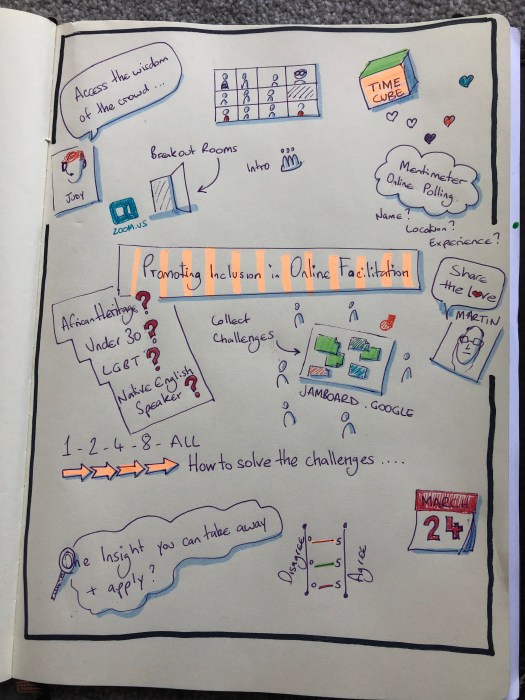This week’s episode of the #IAFpodcast Facilitation Stories features a fascinating conversation on Working in Different Languages in facilitation – I am grateful to podcast co-hosts @PilarOrti and @HeleneJewell for the opportunity to join in, this time also with Simon Wilson CPF|M of @WilsonSherriff.
Listen now, or see the show notes below first for what to expect – and do check out the previous episodes and subscribe for the next at Facilitation Stories – or on Spotify or Apple Podcasts…
Pilar Orti writes in the FS18 show notes…
Helene Jewell, podcast co-host and freelance facilitator based in Bristol, Martin Gilbraith (CPF facilitator and trainer and consultant based in London – who also took part in Episode 7 on facilitation values), Simon Wilson has been running facilitation company for 20 years CPF working internationally and in the UK, based in the Peak District.
The podcast starts with some examples of working with people who speak different languages.
Simon shares a story about working with a UN agency 5 years ago doing a mix of facilitation and training over 20 sessions. Virtual sessions using Webex platform in English, French and Spanish and Simon co-facilitated all of these. He talks about his different levels of competence in these languages and the different dynamics and energy. He used Google Translate to help him and when he was speaking in English which was often not the native language for many participants he had to keep his language simple and avoid too many metaphors.
Helene talks about her time in Nepal as a VSO volunteer Speech and Language Therapist where she delivered lots of different training sessions. She explains that although she had learnt Nepali she initially lacked the confidence to use it initially and how she got through that. And the difficulties of there being “side talk” in another language in the room (Newari).
Martin talks about a Middle East regional gathering for a global NGO – 60 people over 3 days. Martin began his career as an international volunteer for ICA and learnt Arabic in Egypt so still enjoys joining in conversations when he can. He explains why even though he could speak Arabic he had to hold his tongue so as not to exclude the non- Arabic speakers.
Working with interpreters
Simon talks about how developing a relationship with interpreters is a key part of facilitating and how he has a relatively relaxed attitude to losing nuances in translation. He describes how getting interpreters involved in the processes can be helpful and shares an example of a large event he facilitated in Istanbul with 7 different languages that involved interpreters and how it felt a but chaotic but ended up being very collaborative.
Martin talks about whether the interpretation is needed for the facilitator or the participants. He describes a conference in Switzerland which had several different languages that often had interpreters in booths and mediated by technology. The parts that he facilitated were much more participatory and encouraged people to work together at tables, even if they didn’t understand each other’s languages. He notes how this allows communication and connection at a human level even without any language in common.
Helene talks about her experience of being an interpreter with the ICRC for delegates during the conflict in Nepal. She talks about translating every single work (or not) and how as an interpreter it enabled her to concentrate on the spoken words and not get too emotional about the content. She also observed how much the delegates would begin to pick up for themselves even when they didn’t understand the language.
Martin comments that in training facilitation, working with interpreters who don’t understand facilitation is problematic and conversely working with interpreters who are facilitators can sometimes give their own explanations which can also be problematic.
Martin gives a shout out to Mikhael Rossus from Personal Image in Moscow, he is a facilitator and know the ICA’s ToP facilitation really well, and is really good at translating what is said and not giving his own interpretation.
Simon comments on interpretation in virtual and how he has had experienced where it often looks like the participants aren’t there as they are sat to the side of the interpreter who is visible on the screen. He also talks about text translation closed caption text in Googlish which is “almost communication”.
Martin talks about having ideas written in both languages and how you need to be careful in mis-translations when they are written down that they mean the same thing.
Helene talks about working in Devanagari script and how writing and training and facilitating was not something she could efficiently do, so she involved participants to help her.
Simon talks about co-facilitation and working with Jean from FormApart mainly in French and discovering new words in another language that might not be present in your own language. He has also brought the warmth he discovered from Anna in Peru to his English sessions – he has never net her but has developed a connection nonetheless.
Martin recalls working in Russia and how certain phrases don’t mean what you want them to mean if you are not careful – “I want to break you into small groups” can sound painful!
Simon talks about having good French but not having the facilitation words so bringing your language up to date is important.
Pilar herself has learnt all her professional language in English but has been working recently in Spanish (her native language) but doesn’t necessarily have the words.
Helene and Martin both gave examples of when words do not exist in different languages.
Pilar returns to Helene’s comments about working in groups where two languages were spoken and she only understood one (Nepali and Newari) and how she didn’t ever really resolve the difficulties they presented but somehow got around them.
Martin talks about being quite relaxed about not understanding side conversations and that if he misses something he encourages participants to draw his attention to it. And the fact that a lot can be understood without being able to speak the language. He shares an example of working with ICA in Bosnia and how although he didn’t know the language he was able to work out what was going on as he was familiar with the materials and approaches.
Simon recalls some early IAF conferences running facilitated development sessions with different language groups. and that checking with the group that everything is okay is often enough. But when the objective is developing a common understanding then different language groups can be a barrier and how it’s harder to push across language barriers but this is the role of the facilitator.
Martin reminds us that the role of the facilitator anyway is to know when to step in and push people across their comfort zone and when is better to help people stay in their comfort zone.
Helene comments on how even when people don’t share a common language they will usually find a way.
Martin talks about helping a group of different language speakers to come up with a mission statement in English but that for it to make sense in different language (25/30 different languages in this case) they closed the session with coming up with versions in their own languages.
What have these experiences taught us?
Helene talks about how when everyone has to work hard to understand or help others understand a language there can be a feeling of being all in it together. And about confidence and getting on with it.
Simon talks about how co-facilitation being a joy and how it reinforces and challenges his practice and that language barriers can usually be transcended. This is harder in the virtual world.
Martin talks about the fact that there are joys and struggles with working in different languages, but that language and culture are just two different dimensions of diversity. As a facilitator our job is to accommodate diversity as best as we can all the time.
Get in touch via email podcast@iaf-englandwales.org – Send us some text, or even an mp3 audio! Find out more about us over at the England & Wales page on https://www.iaf-world.org.
See also about me, how I work, who I work with and recommendations & case studies, and please contact me about how we might work together. Please do not delay before contacting me – the earlier I hear from you, the more chance that I will be able to help and the more helpful I may be able to be.
Register now on Eventbrite also for my regularly scheduled ToP facilitation training courses in London and Brussels, and now also online.



